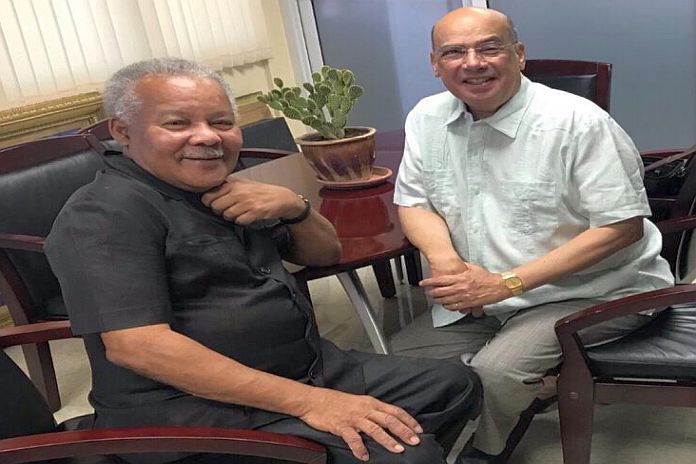The following is a ‘Tribute to Professor the Right Honourable Owen Seymour Arthur, Former Prime Minister of Barbados 1994-2008’ by Sir Ronald Sanders ambassador of Antigua and Barbuda , at a meeting of the Permanent Council of the Organization of American States on Friday, August 14, 2020.
By Sir Ronald Sanders
I join my colleagues from CARICOM countries in thanking you for agreeing to celebrate the life of Professor the Right Honourable Owen Arthur, former prime minister of Barbados.
[It is fitting that this meeting coincides with his funeral service now taking place in Barbados.]
Owen Arthur was elected by the people to serve as prime minister for three terms – 14 consecutive years.
His stewardship of Barbados transformed a small island state into a successful economy, improving the lives of every Barbadian, but particularly those from the underprivileged rural community in which he was born.
By 2007, Barbados was ranked as being the equivalent of a developed country on the strength of the quality of its human development indices.
Owen Arthur was born in Barbados and served it with distinction, but he was also profoundly Caribbean.
He placed great store in the benefits of regional integration, and to creating, within the Caribbean, a single economic space in which nations could pool their individual resources to make a vibrant economic community that is greater than the sum of its parts.
He was the guiding light behind transforming a trade and investment agreement between the European Union and the Caribbean into an “Economic Partnership”.
For him the time had long gone when the Caribbean should simply be a market for goods and services from Europe; he led the way to transform an exploitative colonial trading relationship into one with practical benefits for the Caribbean people.
Up to the day that he was suddenly hospitalized, the interests of the Caribbean Community and the importance of making it a more perfect union, occupied his every waking moment.
I can attest to this, chairman, because for many weeks, prior to his untimely passing, he and I spoke almost every day about the issues faced by the region – issues related to regional transportation, to democracy and political rights, but mostly about the importance of strengthening CARICOM.
His work as a development economist never stopped, nor did his deep commitment to democracy and the rule of law.
His last official duty was as the head of the 54-nation Commonwealth’s Electoral Observer Mission to the general elections in Guyana.
He continued that duty until his dying day, insisting that democracy in Guyana must be safeguarded, and that CARICOM had a sacred responsibility to fight for it.
Guyana’s validly elected president, on the day of his inauguration, said of Owen Arthur: “He was a man committed to justice and to right; a warrior in our cause”.
He was also a strong advocate of Caribbean countries joining their individual sovereignty into a single authority in global affairs, recognising the wisdom of Benjamin Franklin’s words to the fledgling states of America, “We must hang together or surely we shall hang separately”.
He led many Caribbean struggles in the international community, one of which I was privileged to be his deputy.
That was the Caribbean’s resistance to dictation by the Organisation for Economic Cooperation and Development (OECD) to arbitrarily impose tax standards.
He brought to those negotiations in 2001 not only compelling logic and solid economic arguments, but also an insistence that the rich countries of the world understand that one-size shoes do not fit all feet; and that small states require different treatment because of the limitations that size imposes.
Much of what he said in international fora, including to the International Monetary Fund and the World Bank, continues to express compelling truth, especially now as the effects of COVID-19 pandemic wrecks the economies of small states.
He said, for instance, that the need for reform of the global financial architecture is accepted by the Caribbean, but “we submit that it must include representation and participation from all of us. The practice and the politics of exclusion and dictation must cease.”
That is a position of principle that we maintain today, including in this Organization of American States.
In 1998, he made arguments to the global community that have particular resonance today in the context of the criteria by which Caribbean states are measured and treated.
He said, “Even before the start of the current world crisis, many of our own economies were already in crisis. Those economies are still in crisis and are facing the prospect of being engulfed in larger problems, not of our making. More than ever now there is urgent need for those who regard themselves as leaders of the world economy to demonstrate that leadership”.
The Caribbean has lost a great thinker and an outstanding champion.
We are the poorer for his passing and so too is this Organization of American States of which CARICOM countries are an integral part.





